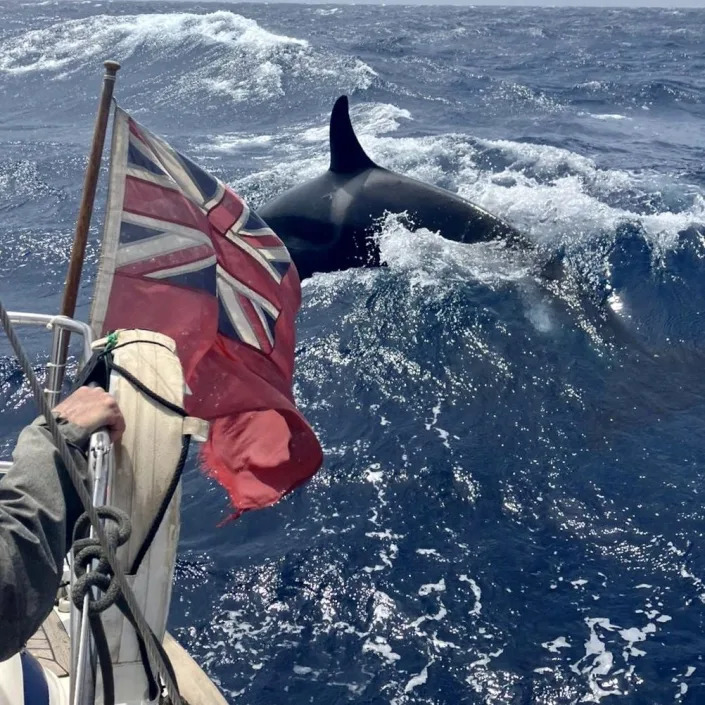
Killer whales attack a sailing boat off the coast of Morocco - Stephen Bidwell / SWNS
A vengeful killer whale called Gladis is teaching gangs of orcas to attack yachts around Gibraltar, and has already sunk three boats.
It may read like something out of Moby Dick, but in this case the truth is stranger than fiction. Researchers believe that a female orca called White Gladis has been seeking revenge after being traumatised by a collision with a boat or being trapped in illegal fishing nets.
Gladis’s attacks are now being copied by the rest of the nearby killer whale population, which have learnt how to ram vessels from their ringleader.
'Critical moment of agony'
On May 2, six of the apex predators slammed into the hull of Bavaria 46, which was sailing in the Strait of Gibraltar, near Tangier in Morocco.
Skipper Greg Blackburn, from Leeds, was already dealing with “heavy weather" of 25-30 knot winds and a rolling swell of six to 10 feet when the whales hit his rudder with two large blows.
“At that point, we were like, 'there's definitely something down there', " he told 9news. “After that was when we got the first sighting of them.”
Two large orcas had carried out the first ram raids but when another four turned up, Mr Blackburn knew there was going to be trouble.
'Oh dear'
"Once the main pod turned up, it looked like there was a matriarch with a calf," he said. “I thought 'oh dear' when I saw them. There's not a lot you can do at that point.”
"After reading reports and knowing what has been going on, I just thought we were in for a ride now."
The skipper dropped the main sail and tried to make the boat “as boring as possible”.
The whales eventually lost interest, but not before causing extensive damage of thousands of pounds, leaving the boat to limp back to port.
Janet Morris and Stephen Bidwell, from Cambridge, were enjoying a sailing course off the coast of Morocco when they spotted the pod approaching - Greg Blackburn / SWNS
The hour-long attack left Cambridge couple Janet Morris and Stephen Bidwell, who were on board for a sailing course, terrified.
"I couldn't believe it when I saw them," said Ms Morris, 58, a business consultant. “We were sitting ducks.”
"Orcas enjoy the thrill of the chase, so ideally we'd have kept still, but that wasn't possible because of the winds,” added Mr Bidwell, a photographer, also 58.
Two days later, a pod of three orcas attacked and sank a third sailboat, piercing its rudder, off the coast of Spain. There was a similar attack in November last year off the coast of Portugal.
Werner Schaufelberger, the captain, said he saw the two smaller whales imitating the ramming tactic of the largest orca.
Full force
“The little ones shook the rudder at the back while the big one repeatedly backed up and rammed the ship with full force from the side," he told Yacht, a German publication.
“The two little orcas observed the bigger one's technique and – with a slight run-up – they, too, slammed into the boat."
Spanish coast guards rescued the crew of the stricken vessel but the boat sank at the port entrance of Barbate after it was towed to shore.
"That traumatised orca is the one that started this behaviour of physical contact with the boat," said Alfredo López Fernandez, a biologist at the University of Aveiro in Portugal and representative of the Atlantic Orca working group.
This "critical moment of agony" made Gladis aggressive towards boats, and that aggressive behaviour is now being copied by other orcas, which are social animals and can learn from each other, he told LiveScience.
The first reports of aggressive orcas off the Iberian coast began in May 2020. In September of that year, Spanish authorities banned sailing boats of more than 50ft from setting sail from the country's northwestern tip after 29 orca ram raids were registered.
The assaults have become increasingly frequent, a study published in the journal Marine Mammal Science in June 2022 said.
The attacks are mainly aimed at sailing boats and have the same pattern. The orcas approach from the stern and hit the rudder before losing interest once they have stopped the boat.

 1 year ago
34
1 year ago
34










 English (US)
English (US)